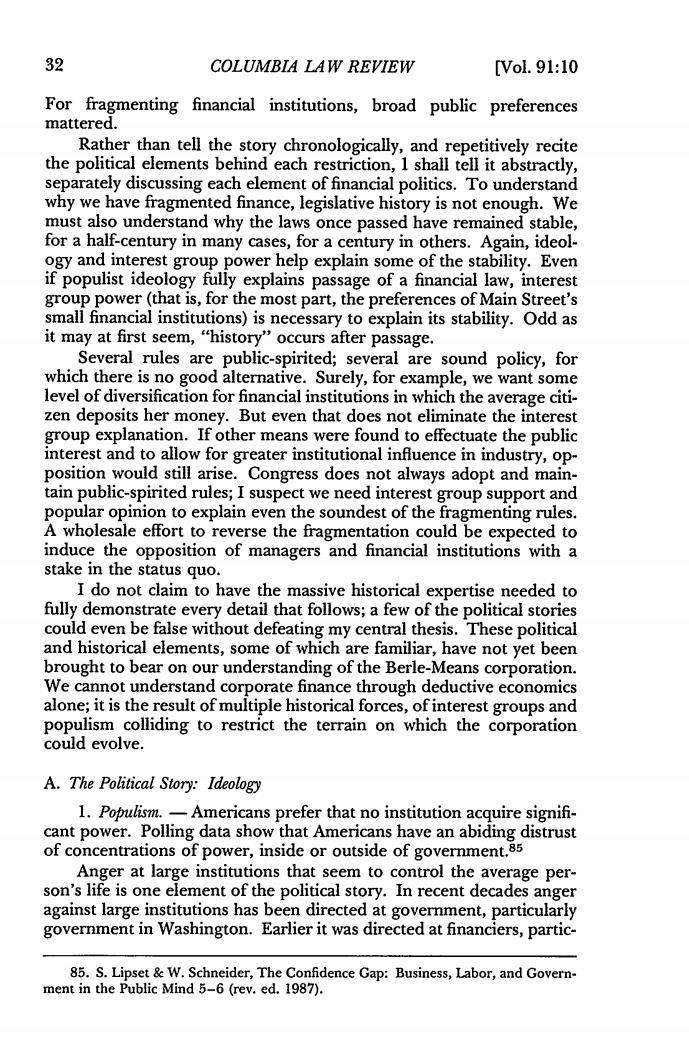正在加载图片...

32 COLUMBIA LAW REVIEW vol.91:10 financial institutions,broad public preferences Rather than tell the story chronologically,and repetitively recite the political elements behind each restriction,1 shall tell it abstractly. separately discussing each eleme why we havefr nted finar t of financial politics. agm e,legislative history is not enough. Ve must also understand why the laws once passed have remained stable, for a half-century in many cases,for a century in others.Again,ideol- ogy and interest group power help explain some of the stability.Even if populist idcology fexplains asae of a finacw rest group Dower (that is,for the most part,the prete ces of Ma eet's acial instituti ns)is necessary to explain its stability.Odd as it may at first seem,"history"occurs after passage. Several rules are public-spirited;several are sound policy,for we vant sor which there is no good alternative.Surely.for level of diversification for fina ancial institutic zen deposits H crage citi But even that does not eliminate the interest group explanation.If other means were found to effectuate the public interest and to allow for greater institutional infuence in industry,op position would still arise.Congress does not always adopt and main tain public-spirited rules;I suspe ct we need inte roup support and to explain ever the e soundes t of the agmenting rule e effort to reverse the fragmentation could be expected to induce the opposition of managers and financial institutions with a stake in the status quo. I do not claim to have the ive historical pertise needed to fully demor ra eve ry detail that follows;a fev could of the political stor even be alse without defeating my central thesis.These political and historical elements,some of which are familiar,have not yet been brought to bear on our understanding of the Berle-Means corporation. We cannot understand corporate finance through deductive economics alone;it is the result of mul ple historical for t groups s and colliding to restrict the terrain on which A.The Political Story:Ideology 1.Populism cant power.Polling data show of concentrations of power.insit mer v aidmdistrust Anger at large institutions that seem to control the average per- son's life isone eement of the political story.In recent decades against large titut ons has bo government in Washington.Earlier it was directed at financiers,partic 85.S.L ment in the Public Mind 5-6 onfidence Gap:Business,Labor,and Govern ed198刀.COLUMBIA LAW REVIEW For fragmenting financial institutions, broad public preferences mattered. Rather than tell the story chronologically, and repetitively recite the political elements behind each restriction, I shall tell it abstractly, separately discussing each element of financial politics. To understand why we have fragmented finance, legislative history is not enough. We must also understand why the laws once passed have remained stable, for a half-century in many cases, for a century in others. Again, ideology and interest group power help explain some of the stability. Even if populist ideology fully explains passage of a financial law, interest group power (that is, for the most part, the preferences of Main Street's small financial institutions) is necessary to explain its stability. Odd as it may at first seem, "history" occurs after passage. Several rules are public-spirited; several are sound policy, for which there is no good alternative. Surely, for example, we want some level of diversification for financial institutions in which the average citizen deposits her money. But even that does not eliminate the interest group explanation. If other means were found to effectuate the public interest and to allow for greater institutional influence in industry, opposition would still arise. Congress does not always adopt and maintain public-spirited rules; I suspect we need interest group support and popular opinion to explain even the soundest of the fragmenting rules. A wholesale effort to reverse the fragmentation could be expected to induce the opposition of managers and financial institutions with a stake in the status quo. I do not claim to have the massive historical expertise needed to fully demonstrate every detail that follows; a few of the political stories could even be false without defeating my central thesis. These political and historical elements, some of which are familiar, have not yet been brought to bear on our understanding of the Berle-Means corporation. We cannot understand corporate finance through deductive economics alone; it is the result of multiple historical forces, of interest groups and populism colliding to restrict the terrain on which the corporation could evolve. A. The Political Story: Ideology 1. Populism. - Americans prefer that no institution acquire significant power. Polling data show that Americans have an abiding distrust of concentrations of power, inside or outside of government.8 5 Anger at large institutions that seem to control the average person's life is one element of the political story. In recent decades anger against large institutions has been directed at government, particularly government in Washington. Earlier it was directed at financiers, partic- 85. S. Lipset & W. Schneider, The Confidence Gap: Business, Labor, and Government in the Public Mind 5-6 (rev. ed. 1987). [Vol. 91:10